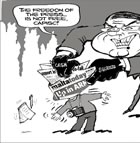
A few considerations on the issue of censorship Anyone who is remotely interested in how the censorship issue is evolving can’t have missed that clip from Net TV (available on YouTube) which shows Owen Bonnici, Labour’s fresh-faced shadow spokesman delivering his calm and composed anti-censorship speech in front of the law courts. A few points for your consideration. 1) The French contemporary philosopher Alain Finkielkraut on censorship (quoted in Pascal Mbongo’s “La Banalisation du Concept de Censure” in Issue 130 of French journal Pouvoir, my translation): “I am not hostile to the concept of censorship. Every society operates on the basis of a number of prohibitions. Censorship occasionally threatens freedom but the fight to remove censorship completely, leads to nihilism and nihilism – everything is possible, everything is permitted, it’s all the same – threatens civilization.” 2) “When it comes to censorship, artists and journalists often claim for themselves a privileged socio-legal role within society which is not enjoyed by the public at large” (Pascal Mbongo is the article quoted above). 3) “Can pornography be considered art? While we often associate eroticism with literature, can a pornographic text be considered literature?” (Joseph Vebert in his guide ‘100 Romans érotiques incontournables’ (Librio) commenting on Le pornographe et ses modèles, a novel by popular French author Esparbec). 4) “Without omitting the slightest detail, without linguistic floweriness or carefully chosen words...what gives this novel all its force is that it is not the result of a writer’s fertile imagination, but of a voyage into the writer’s own memory...” (Joseph Vebert commenting on La vie sexuelle de Catherine M by Catherine Millet). 5) “Given a choice between ethics and literature, an author must always choose one AGAINST the other. There can be no compromise or ‘healthy half-way’ between, on the one hand, the verbal ability to solely evoke and praise what ought to be while refuting and condemning what is, and on the other hand, the poetic genius which exposes, or even over-exposes, what exists while remaining indifferent to what ought to be.” (Frédéric Schiffter in Le bluff éthique [Flammarion]).
Any comments? |
EDITORIAL
MT Surveys Who’s the most trusted nanny in Gonzi’s cabinet? Consumers fishing around for better deals Robert Arrigo ‘most wanted’ for minister Cabine thrives, but Fenech and Gatt hit rock bottom Bleak times – depression at the Grand Harbour Budget 2010 – Raise taxes or cut benefits? Only 35% will be taking a holiday this summer Corned beef? a matter of class Labour poised for absolute majority |
Managing editor Saviour Balzan | Tel. ++356 21382741 | Fax: ++356 21385075 | Email



